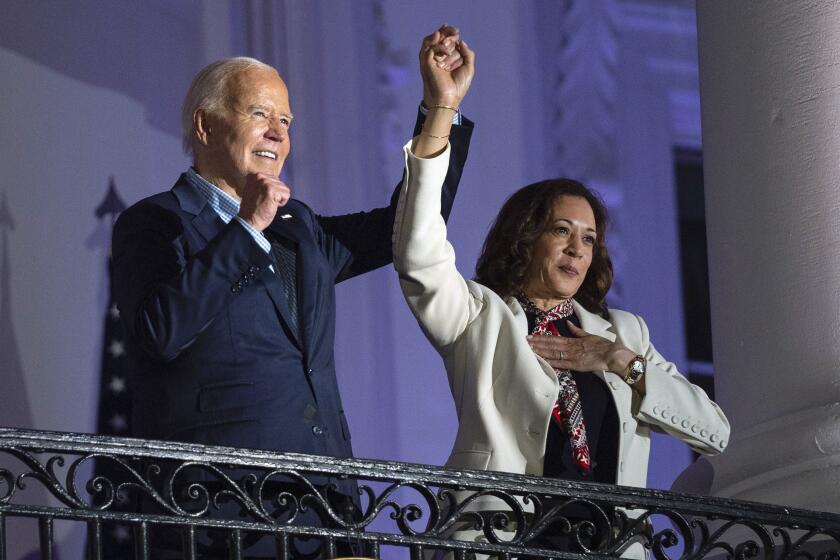Newsletter: What will Iran do next?

As Washington and Tehran step back from the brink of war, President Trump is claiming success. But there’s a more menacing dilemma in what Iran’s next maneuver might be, and Iraqis are fearful.
TOP STORIES
What Will Iran Do Next?
Faced with the possibility of a full-scale war with Iran, President Trump chose Wednesday to deescalate, wrapping a conciliatory message in bellicose rhetoric. He said he would impose new economic sanctions, a move of limited impact, but otherwise did not retaliate for its missile strikes, which inflicted no U.S. casualties, whether by luck or intention.
Yet the larger, more menacing dilemma is what Iran’s next maneuver will be. Tehran is skilled at asymmetrical warfare, cyberattacks and bold strikes and has third-party forces, such as Hezbollah, it can call on to create conflicts across the Middle East.
In Iraq, meanwhile, a sense of helplessness has crept into Baghdad’s merchants and leaders alike. Behind the customary fatalistic jokes is a very serious fear of an all-out war between Washington and Tehran with Iraq as its chessboard and Iraqis, again, as pawns.
How Iran Lets Trump ‘Have It Both Ways’
By avoiding a war he nearly started, and by projecting triumphalism while retreating from a threat of retaliation, Trump claimed a success that fits neatly with his political identity — provided the fragile calm holds.
“Politically, the confrontation with Iran allows Trump to have it both ways,” said Yascha Mounk, a professor of international affairs at Johns Hopkins University. “He will claim he’s the tough guy who’s taken out [Iranian Gen. Qassem] Suleimani, and that he’s an isolationist who has avoided embroiling America in another war in the Middle East.”
Now comes Congress’ turn to assert its role. The House votes today on a war powers resolution to limit what military action Trump can take against Iran, after Democrats and even a few Republicans complained an administration briefing on the justification for killing Suleimani came down to a simple “Trust us.” But history suggests Congress will fail again to exercise its authority.
California’s Calls for Homelessness Help
New legislation aims to speed up construction of affordable housing and homeless shelters by making all new low-income housing projects exempt from a key environmental law that has been used to restrict development. The law is credited with helping to preserve California’s natural beauty, but it also requires developers to disclose and reduce projects’ impacts, a process that can drag on for years.
Meanwhile, Gov. Gavin Newsom is asking lawmakers to allocate more than $1.4 billion to various local and state-run efforts to fight homelessness, much of it earmarked as subsidies for immediate housing and community healthcare services, with the budget he’ll send lawmakers Friday.
More From Sacramento
— Newsom is also expected to embrace an effort to extend health coverage to seniors without legal status.
— In his second year, the governor needs to start producing results and focus on the achievable, columnist George Skelton writes.
— Last year, planned power outages to prevent wildfires cost some Californians their phone service too. Now some lawmakers want to require telecom companies to have backup power for cellphone towers in high-risk areas, lest people be unable to call 911.
— There will be no special election to fill Rep. Duncan Hunter’s congressional seat, Newsom says. That means the Southern California district won’t have a representative until next year.
Where Are All of L.A.’s #MeToo Charges?
The #MeToo movement is more than two years old. Scores of women have come forward to accuse Harvey Weinstein and others of sexual assault. They’ve changed the culture and the conversation. But to date, charges have been filed in Los Angeles County in only two cases, only against Weinstein and only on Monday. Why hasn’t more happened?
Dist. Atty. Jackie Lacey says more than 40 other cases have been presented to her office in the past two years; all, she said, have been lacking in one of two ways. “The alleged crimes were too old to prosecute,” she said. “Or there was insufficient credible evidence to file charges against the defendant.” Her first point is hard to argue. The second is where the trouble begins, and where accusers like actress Jessica Barth — one of those other 40 cases — become furious.
Your support helps us deliver the news that matters most. Subscribe to the Los Angeles Times.
Start your day right
Sign up for Essential California for the L.A. Times biggest news, features and recommendations in your inbox six days a week.
You may occasionally receive promotional content from the Los Angeles Times.
FROM THE ARCHIVES
Had you walked the streets of L.A. a century ago, you’d find plenty of early 20th-century style to admire. Photos from our archives show downtown Los Angeles bustling with street cars and pedestrians, many dressed their best. Even the wealthy took public transportation with their giant matinee or picture hats. Others wore furry hand-warmers, which became status symbols for socialites in the 1910s. Another photo from our archives shows more styles from the era.
CALIFORNIA
— More than 1.4 million children covered by Medi-Cal have not received the required testing for lead poisoning. State auditors say two agencies charged with testing for and preventing exposure have fallen short.
— Uber made changes to its app in California, tweaking fares and features, to comply with the new gig-worker law.
— On the anniversary of his death, the sisters of Timothy Dean, who died in the West Hollywood home of Ed Buck last year, have sued the wealthy Democratic donor, saying he preyed on black men and injected Dean with a lethal dose of crystal meth for his own sexual gratification.
— The L.A. County Board of Education has voted to close an Inglewood charter school with a long history of financial problems that has exposed flaws in the oversight system. The nonprofit that runs it was the subject of a Times investigation into its wealthy founders.
— A century-old conservation group raised nearly $16 million to buy the Alder Creek Grove of giant sequoias, realizing a long-held dream of acquiring the world’s largest private holding of the world’s largest trees.
HOLLYWOOD AND THE ARTS
— Fran Drescher’s beloved sitcom “The Nanny” is heading to Broadway as a musical.
— The Oscars broadcast is again going hostless.
— 2019’s top films featured a few more female characters. But there’s still progress to be made: Most of those characters were white, according to a new report.
— When it comes to queer stories on TV right now, family is king.
— “Ugly Betty” creator Silvio Horta has died at the age of 45. America Ferrara, Vanessa Williams and other stars of the Emmy-winning show are mourning his loss. The family says he struggled with addiction and depression.
NATION-WORLD
— Britain’s Prince Harry and his wife Meghan Markle say they are “stepping back” as senior members of the royal family and plan to spend more time in North America. They’re also changing their media strategy and giving “The Crown” its happy ending.
— Iran says the crew of a Ukrainian jetliner that crashed in Iran, killing 176 people, never made a radio call for help and were trying to turn back for the airport. Ukraine says it considered a missile strike or terrorism as possible theories for the crash.
— A day after Puerto Rico’s strongest earthquake in a century, the culmination of a string of temblors, hundreds of thousands of people remained without water and another half a million without power. And then came a strong aftershock.
— People in the path of wildfires razing southeast Australia are being urged to evacuate today if they don’t intend to defend their homes, as hot and windy conditions are forecast to heighten the danger.
— Americans’ cancer death rate has seen its biggest-ever one-year decline, researchers found, a drop they attribute to advances in lung-tumor treatments.
— The federal government won’t get in the way of the growing number of driverless cars and trucks hitting the highways, new guidelines suggest. They aim to spur further development while emphasizing safety, the Department of Transportation said.
BUSINESS
— At a 2½-hour news conference in Beirut, Nissan’s fugitive ex-boss Carlos Ghosn called his arrest last year in Japan a plot against him and his detention conditions a “travesty” against human rights. He said he thought before fleeing: “You are going to die in Japan, or you are going to get out.”
— A vegan missed fast food, and Beyond Meat was born. The El Segundo-based company’s plant-based meat has impressed customers and investors with its carefully calculated “flexitarian” pitch. But can it live up to its founder’s wildest dreams?
— The MillerCoors brewery in Irwindale, the victim of a years-long light-beer sales slump, is slated to close — unless rival Pabst wants to buy it.
SPORTS
— We’ve spent three months enjoying the Lakers’ blessings. Now Anthony Davis’ new injury is a reminder of their curse, Bill Plaschke writes.
— Mick Cronin is taking an honest approach to reviving UCLA basketball, columnist Dylan Hernandez writes.
— One egregious error after another has eroded public confidence in the Pac-12’s officiating crews. On Monday, the championship game between LSU and Clemson will test the conference’s effort to rehabilitate their reputation.
OPINION
— We may have dodged a bullet this time with Iran, but we also must recognize that Trump’s personal volatility is dangerous, the Times’ editorial board writes.
— California started the year with new laws on the gig economy and data privacy. Will they survive Silicon Valley? Columnist Patt Morrison consulted Scott Galloway, a marketing professor at New York University.
— U-Haul says it will stop hiring people who use nicotine in 21 states. That’s creepy and inappropriate, the editorial board says.
WHAT OUR EDITORS ARE READING
— For music’s biggest names, the tour never ends — not even when you’re dead. Inside the rise of holograms and the companies that build them. (New York Times Magazine)
— Americans love almond milk. But honeybees are struggling to meet demand in California’s almond industry, with deadly consequences. (The Guardian)
— The curious case of the evaporating exoplanet. (The Atlantic)
ONLY IN L.A.
John Zabrucky’s Modern Props is a Hollywood institution, but at 72, he has decided to close shop. Buffeted by the exodus of production from Hollywood and the march of time, the man who spent four decades fashioning the look of the future wants to focus on his own. But first, he gave us a tour of his wares — futuristic weapons, a spaceship command deck, rows of computer consoles, radar scanners, shelves packed with sophisticated high-tech gadgetry, an alien autopsy and an obscure series of tubes that’s popped up in more than 100 movies and TV shows, from “Austin Powers” to “Star Trek: The Next Generation.”

If you like the Today’s Headlines newsletter, please share it with friends. Comments or ideas? Email us at headlines@latimes.com.
Sign up for Essential California
The most important California stories and recommendations in your inbox every morning.
You may occasionally receive promotional content from the Los Angeles Times.



